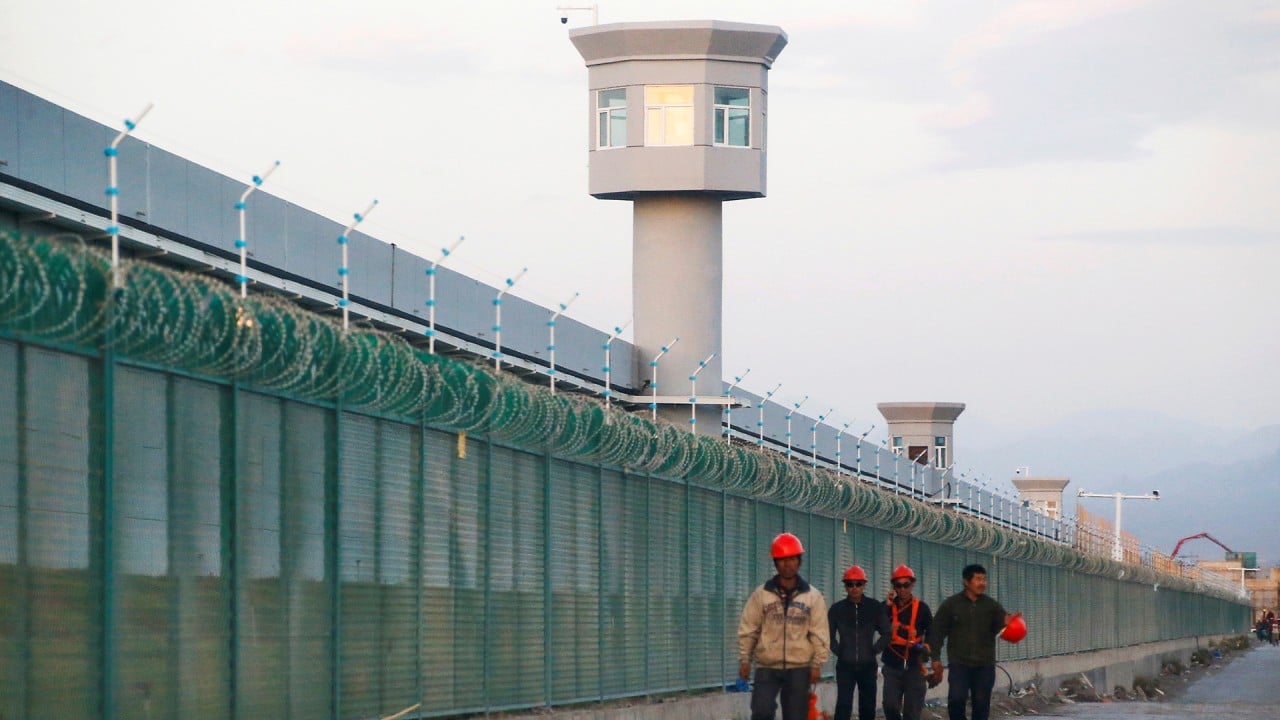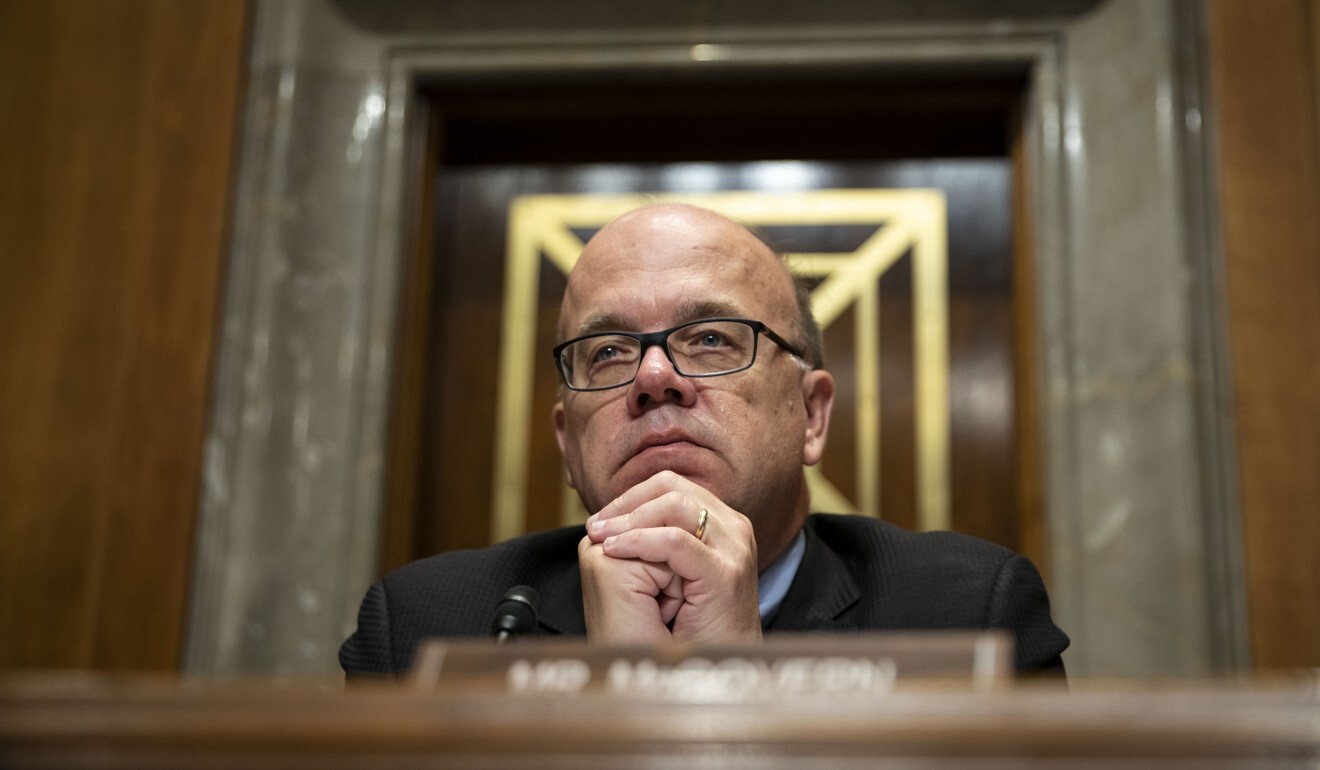
Bill to ban imports of all Xinjiang products reintroduced in the US House of Representatives
- Legislation, now in both chambers, would prohibit import of any goods unless ‘convincing evidence’ shows forced labour was not involved in production
- While White House support is unclear, Biden has pledged Beijing will face ‘repercussions’ for its actions in Xinjiang
The US House of Representatives has reintroduced sweeping legislation that would ban the import of all goods sourced in China’s Xinjiang Uygur autonomous region, over concerns of widespread, state-backed forced labour there.
Lawmakers filed the bill, the Uygur Forced Labour Prevention Act, on Thursday, almost five months after the House approved a previous version in a near-unanimous vote. That legislation, which had broad bipartisan support, was wiped from the docket after it failed to move through the Senate before that congressional session came to a close in January.
If enacted, the bill would prohibit US businesses from importing any goods produced wholly or in part in Xinjiang, unless there is “clear and convincing evidence” that forced labour was not involved in their production.
The presumption that all goods sourced in Xinjiang are tainted with forced labour revises current US customs laws, which prohibit imports if there is evidence they have been produced using forced labour.

01:54
China hits back at UK claims of forced sterilisations and other human rights abuses against Uygurs
“We have watched in horror as the Chinese government first created and then expanded a system of extrajudicial mass internment camps targeting Uygurs and Muslim minorities,” Representative James McGovern, the Massachusetts Democrat who led the legislation in the House, said in a statement.
Charging that many US, Chinese and international companies were “complicit” in the exploitation of forced labour in Xinjiang, McGovern said it was “long past time for the Congress to act”.
The Chinese government denies the presence of forced labour in Xinjiang, and has previously accused US lawmakers of using the issue as a pretext to target Chinese companies. The Chinese embassy in Washington did not respond to a request for comment on the bill’s filing on Thursday.
The reintroduction came three weeks after the Senate did the same with its version of the bill, which has already secured bipartisan support from almost a third of the chamber.
Should the two versions secure approval in their respective chambers, any discrepancies will need to be reconciled before the legislation can be sent to the White House to be signed into law – or vetoed – by US President Joe Biden.
While it’s unclear what support the measure has in the White House, Biden pledged this week that Beijing would face “repercussions” for its actions in Xinjiang, though his administration has yet to announce any specific actions. The White House did not respond to a request for comment.
As for the legislation’s next step, McGovern “will be asking the House committees of jurisdiction to act as soon as possible, especially considering the overwhelmingly bipartisan vote last year,” said Jonathan Stivers, staff director at the Congressional-Executive Commission on China (CECC).
Lawmakers in the House approved McGovern’s previous version of the bill in September by an overwhelming 406-3 majority.

As that bill passed through the congressional stages last year before dying in the Senate, the departing Trump administration took a number of executive actions to stem the flow of forced labour-tainted goods from Xinjiang entering the US – though stopped short of a ban on all imports.
In January, the Trump administration announced a ban on all cotton and tomato-based products sourced wholly or in part from Xinjiang. That came atop a number of stand-alone import bans targeting specific Chinese entities deemed to be connected to forced labour.
US bans all imports of cotton and tomato products from Xinjiang
Beyond the blanket ban on all goods sourced from Xinjiang, the legislation reintroduced Thursday also directs the administration to impose financial sanctions and entry bans on any individual, including Chinese government officials, deemed responsible for forced labour in Xinjiang.
This new bill also adds polysilicon, a raw material used in the manufacture of solar panels, to a list of “high priority” sectors for which the administration would be required to produce specific enforcement plans. Last year’s bill named only tomatoes and cotton.
Polysilicon’s inclusion follows the publication of a research study detailing close ties between Xinjiang’s polysilicon industry to indicators of forced labour, including the government-coordinated resettlement of Uygur labourers and “re-education” programmes for those workers.
“It is encouraging to see Congress paying attention to China’s human rights abuses – and tangible responses to them,” said Emily de La Bruyere, a founder of the Horizon Advisory consulting firm and an author of the study. “It is especially encouraging to see foundational, emerging domains, like the solar supply chain, on the list. These are areas that Chinese industrial policy has prioritised, and prioritised in Xinjiang, over the past decades.”
Wind turbines from Xinjiang may get caught in political tempest
Recent scrutiny of the industry has prompted more than 200 solar companies to sign a pledge issued by the Solar Energy Industries Association to take steps to ensure that forced labour is absent from their supply chains.
Among other updates, the new House bill requires the administration’s enforcement strategy to include provisions concerning products made with forced labour by Uygurs and other ethnic minority groups in China beyond Xinjiang.
While welcoming the legislation, Nathan Picarsic, another Horizon Advisory founder, said that any tangible impact would hinge on the degree to which the agencies assigned to its enforcement follow its “letter and spirit”.
“The administration has promised to usher in a new era of US industrial strength, to ‘build back better,’” said Picarsic. “Here’s the chance to ensure that that process reflects our values and norms, especially respect for human rights.”
Additional reporting by Jacob Fromer

